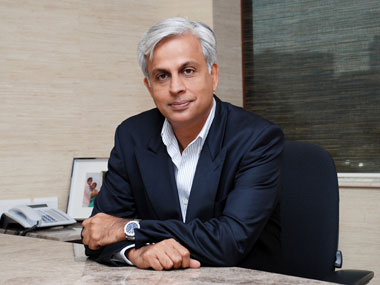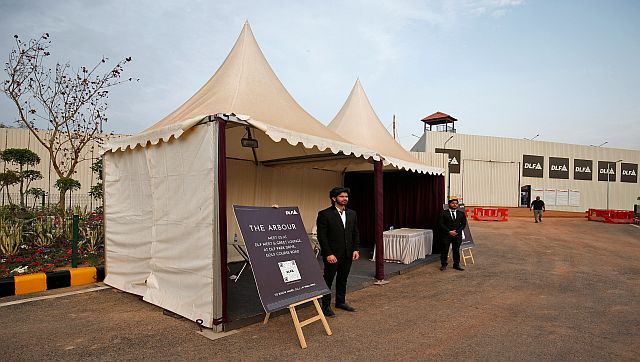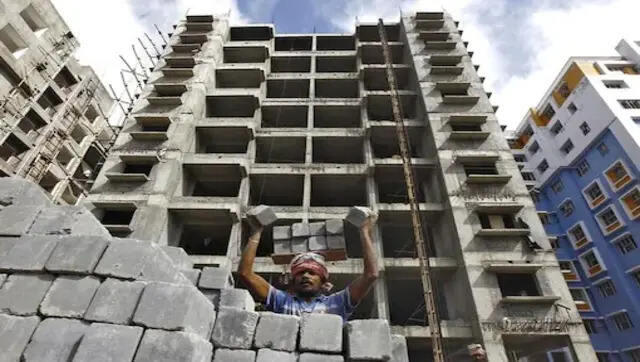New Delhi: DLF, the largest commercial real estate developer in the country, has been in the news for looking to exit the Mumbai market and the fine of Rs 630 crore imposed on it by the Competition Commission of India.
In an exclusive interview with Firstpost, Mohit Gujral, vice chairman and managing director of DLF, tell us about the land deal, the fine and more.
Below are edited excerpts of the interview. Watch the full interview in the accompanying video.
Outlook for the realty sector in 2012-13
A lot of real estate is driven by sentiment. So at the moment I would say the sentiment is a little weak, but a lot of it is being driven by the media – the situation on the ground is not as bad as it is made out to be. But realty is region-specific and developer-specific. DLF has chalked out a business plan which we think is not regressive – I would say above moderate – and we are committed to achieving that business plan.
You have to be on your feet and move with the markets. The markets don’t cease, at least in India. Sometimes there is an oversupply and some places are price-sensitive and so you ought to have products which can move with the market. In DLF, fortunately, we are reasonably diversified in product type and region. So overall I would not be so pessimistic over the market.
North India’s obsession with owning land…
If you look at the north there is a very high degree of owning land, still. Of course, it’s the developers who have now realised the value of land and typically would rather build on it – housing, retail, commercial – and therefore the dream of owning an individual piece of land had become reasonably remote for most people.
A lot of people who made money with DLF, having earlier bought land from us, thought this is an express opportunity to reparticipate in land ownership with DLF. Fortunately for us, whenever we did launch the land and developed projects, they did extremely well.
South India’s first time homebuyers and how the IT sector is driving the region’s realty…
In the south, it’s a lot of IT-driven growth and typically the double-income earning couple - or even the single income - it’s their first time home buy and therefore they are looking for a more value, mid-value home because that’s where the mass volume is.
It’s not that there isn’t a high end market….so both spectrums exist. But there is a very large spectrum in the south which is the IT based spectrum and that is a sustained growth in the area. It’s not on fire, like the north - where there are very high peaks and troughs - because it’s very investor driven. In the south people buy because they want to have their house. It is a very steady market and that continues. It is also very price sensitive, but, if one has the right products at the right price, the market is there.
On the Mumbai plot sale, who DLF is exiting the city’s market and the plot’s role in debt reduction…
We are in talks with 3-4 parties and it largely won’t happen n a day. So we are also trying to ensure that we get the best value. We are in no hurry and in the sense we want to look at it as an exit option.
As far as DLF is concerned, we bought a piece of land, we got permissions on that piece of land - it’s like a plotted sale - we already added tremendous value to that piece of land. So whether we build or not, doesn’t mean we are not developing if we are selling it as one big piece of land. Like any developer we would like to get maximum value. We are pert close to reaching an agreement with someone.
Our debt is overplayed as an instrument. DLF has never ever in it’s history defaulted on it’s debt payment, our credit rating is high, we have borrowed as much as we can service. There is a perception in the market that this debt is high and at the current interest rates we believe that shedding some of it, doesn’t hurt our cause anyway.
Therefore we are only looking at exiting those assets or markets where we don’t have a significant presence. So Mumbai for example is a brand new market and we are not sure whether we have the bandwidth or the inclination at the moment to open up a new market, take the risk at such high levels - where we still have so much to do in the current markets that we are in. So sometimes, you got to take stock and say, do we really want to open something new.
Why has DLF not been able to replicate its success in the Delhi NCR to a pan-India level?
There are very few developers in the world that have actually even tried to succeed on a large geography. Real estate per say is a fairly localized business - people in New York are in New York, people in London are in London - and they are not all over the US or UK.
Recently, the only example I can give where some developers have gone across the country will be China. How successful they are time will tell. But, I think they may be reasonably successful because ownership is centralised. In India to understand real estate, one has to understand the laws of the land locally in each state. You have to have deep knowledge and even a relationship with the agencies that run through approval processes to understand approval processes in each state because it is very different.
What explains the inability of India’s top builders to address the broader demand for housing?
If you look at mass housing, it’s a very interesting subject, but it’s a business in itself. But, it’s about assembly line, it’s about being able to manage the last mile in terms of the closes driven construction because your margins are in the volumes. Now, it requires a totally different culture and mindset.
There is a market for everything, but it is a mistake if you want to do everything. I’m sure there are developers who decided this is a niche and they have been doing a wonderful job but we culturally have not gone into that area. If we try to do so, I’m sure we will do a good job, but whether we are at that same speed or that same economy, I’m not sure. So why struggle to do what we are not the best at.
Your company stocks have crashed by almost 50% over the past two years. This is true of other builders as well. Why then are property prices going up, as stocks take a dip?
Most developers don’t own historic land banks, they have bought it in recent times - probably in the last three to four years when the property prices have been the highest. Most properties have been bought against loans, the cost of borrowing money has only gone higher, inflation is gone up, the cost of construction is only gone higher. So therefore why are people blaming developers?
Have interest rates come down? Has land become cheaper? Have cement and steel prices gone down? So developers are only the end product of all these factors that come together and therefore it’s a bit of a misnomer that prices should come down.
You have to understand the larger picture of the economy. The developer has no magic wand unless he wants to sell at a loss. The developer’s overheads are fixed, he has to service his loans. So it’s not that the developer has any vested interest in keeping the price high.
Investor driven real estate markets: what they mean for the sector and other consumers…
I won’t be able to say too much about the Mumbai market because I have not gone deep into it, but definitely in the NCR and north India people are far more flamboyant and far more used to property investments. Therefore investors drive a lot of real estate market. Sometimes it’s good because it gives you very good volumes but sometimes it is wrong because it misleads you into believing what the market is. So what happens is you peak and then there’s a slowdown because the investor’s appetite is exhausted, he wants to turn around that money and therefore he starts making his exits and then again he’s back in the market. So there are highs and lows in these kind of markets.
Is DLF refocussing on its home market Delhi NCR and why?
There’s a bit of an over read into coming back into the north. We are everywhere, we are not coming back to anything. It’s just that in the north we had the fortune of having larger land banks - and therefore we sort of did some of the plotted sales - which is something we don’t have in the south.
So we haven’t really come back by changing our focus. It’s just that the opportunity was there and we took it. But we continue to build in the south in the same manner as we built earlier and in the same steady state that we were earlier. So it’s not that we have deaccelerated our growth there. It’s just that we have accelerated our growth in the north with some of the new products.
Bangalore and Chennai: the country’s new real estate hubs?
In Chennai and bangalore we have a large spectrum – the value home projects, the mid value projects and so called luxury projects. Most are first hand buyers and some are upgrading. But I would say 75 percent are first hand buyers.
Fortunately, these are the IT hubs and if there are jobs and employment these cities will grow.
On DLF’s appeal against the Competition Commission of india’s ruling of a Rs 630 crore fine on it…
The arguments are still going on, we believe we have a good case and we are going to present our point of view which I believe is right. We have hopefully gone through with the right decision.
Status of the Gurgaon Metro Rail - from Sikandarpur to DLF’s mall of India…
We have tendered and awarded it in the time we were supposed to. The time frame is three years to complete but we are trying to do it faster than that because it will change the life and environment sooner. We are sure we will finish it on time but the idea is how much sooner can we do it.
)
)
)
)
)